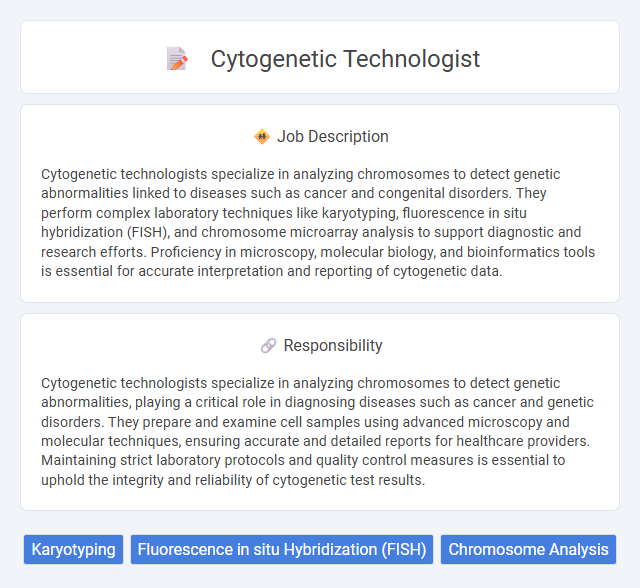
Cytogenetic technologists specialize in analyzing chromosomes to detect genetic abnormalities linked to diseases such as cancer and congenital disorders. They perform complex laboratory techniques like karyotyping, fluorescence in situ hybridization (FISH), and chromosome microarray analysis to support diagnostic and research efforts. Proficiency in microscopy, molecular biology, and bioinformatics tools is essential for accurate interpretation and reporting of cytogenetic data.
Individuals with strong analytical skills and attention to detail may be well-suited for a cytogenetic technologist role, as the job requires interpreting complex chromosomal data. Those who are comfortable working in laboratory settings and handling repetitive tasks could likely adapt to the precise and meticulous nature of this profession. However, people who prefer dynamic, fast-paced environments or have difficulty with prolonged concentration might find this job less compatible with their natural tendencies.
Qualification
Cytogenetic technologists require a bachelor's degree in clinical laboratory science, molecular biology, or a related field, with specialized training in cytogenetics. Certification from recognized bodies such as the American Society for Clinical Pathology (ASCP) enhances job prospects and demonstrates expertise in chromosomal analysis techniques. Proficiency in laboratory procedures, karyotyping, fluorescence in situ hybridization (FISH), and genetic testing is essential for accurate diagnosis and research.
Responsibility
Cytogenetic technologists specialize in analyzing chromosomes to detect genetic abnormalities, playing a critical role in diagnosing diseases such as cancer and genetic disorders. They prepare and examine cell samples using advanced microscopy and molecular techniques, ensuring accurate and detailed reports for healthcare providers. Maintaining strict laboratory protocols and quality control measures is essential to uphold the integrity and reliability of cytogenetic test results.
Benefit
A career as a cytogenetic technologist likely offers competitive salaries and strong job stability due to growing demand in medical diagnostics. Professionals in this field probably benefit from opportunities to work with advanced laboratory technologies, enhancing skill development. Employee benefits may include health insurance, retirement plans, and continuing education support to promote career growth.
Challenge
Working as a cytogenetic technologist likely involves navigating complex laboratory procedures that require precise analysis of chromosomes to detect genetic abnormalities. The role probably demands staying updated with rapidly advancing technologies and methodologies, which can present ongoing challenges in skill adaptation. Managing high-stakes diagnostics may also contribute to workplace pressure, emphasizing accuracy and detailed attention in every test conducted.
Career Advancement
Cytogenetic technologists specializing in chromosome analysis and genetic disorder diagnostics can advance their careers by gaining proficiency in molecular techniques such as FISH and microarray analysis. Obtaining certifications like the American Society for Clinical Pathology (ASCP) Board of Certification enhances professional credentials and opens opportunities for supervisory or laboratory management roles. Continuous education in genomic technologies and participation in research projects also contribute to career growth within clinical and research cytogenetics.
Key Terms
Karyotyping
A Cytogenetic Technologist specializes in performing karyotyping to analyze chromosome structures and identify genetic abnormalities. They prepare slides from patient samples, stain chromosomes, and utilize microscopy techniques to detect numerical and structural chromosomal anomalies. Proficiency in laboratory protocols, cytogenetic software, and knowledge of genetic disorders is essential for accurate chromosomal analysis and reporting.
Fluorescence in situ Hybridization (FISH)
Cytogenetic technologists specializing in Fluorescence in situ Hybridization (FISH) perform advanced molecular diagnostic testing to detect chromosomal abnormalities and genetic disorders. They prepare and analyze patient samples using fluorescent probes that bind to specific DNA sequences, enabling precise visualization of chromosomal rearrangements, deletions, or amplifications under a fluorescence microscope. Expertise in FISH enhances accurate diagnosis in oncology, prenatal testing, and genetic disease research.
Chromosome Analysis
Cytogenetic technologists specializing in chromosome analysis prepare and examine chromosomes to detect genetic abnormalities linked to diseases and developmental disorders. They utilize advanced microscopy and imaging techniques, such as karyotyping and fluorescence in situ hybridization (FISH), to analyze chromosomal structure and number. Expertise in cell culture, chromosome banding, and genetic anomalies identification is essential for accurate diagnostic reporting and research support.
 kuljobs.com
kuljobs.com